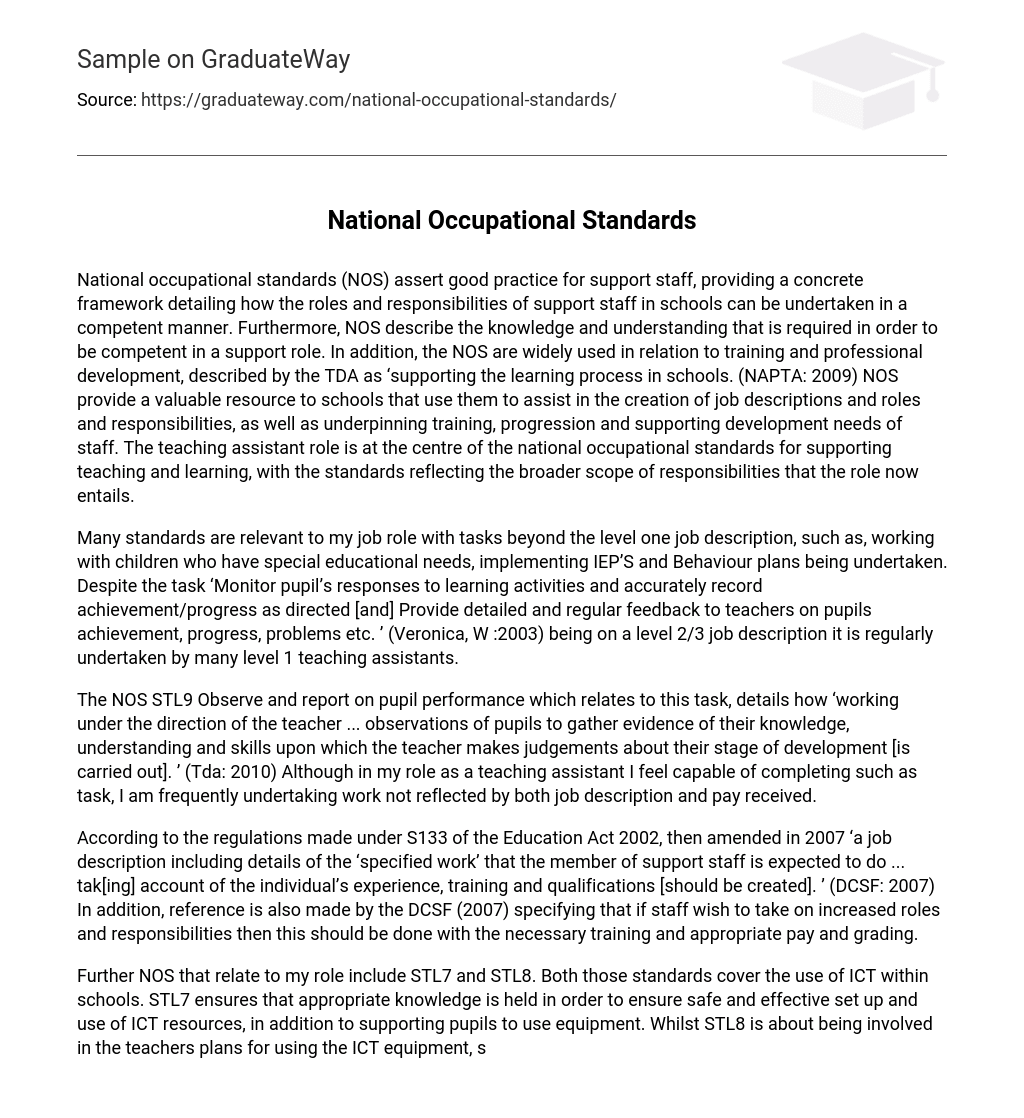NOS are guidelines for support staff in schools, outlining their roles and responsibilities, as well as the necessary knowledge and understanding. They are widely used for training and professional development, supporting learning in schools (NAPTA: 2009). Schools find NOS valuable for creating job descriptions, defining roles, and supporting staff development. NOS for supporting teaching and learning center around the teaching assistant role, encompassing the expanded responsibilities of the position.
Many standards are applicable to my role, extending beyond the level one job description. These include working with children who have special educational needs, implementing IEP’s and behavior plans. Despite the fact that the task “Monitor pupil’s responses to learning activities and accurately record achievement/progress as directed, and provide detailed and regular feedback to teachers on pupils’ achievement, progress, problems etc.” (Veronica, W :2003) is specified in a level 2/3 job description, it is often carried out by many level 1 teaching assistants.
The NOS STL9 describes the process of observing and reporting on pupil performance. This involves working under the teacher’s direction to observe pupils and gather evidence of their knowledge, understanding, and skills. The teacher then uses this evidence to make judgements about the pupils’ stage of development. As a teaching assistant, I am capable of completing this task. However, I often find myself doing work that is not outlined in my job description and not compensated for adequately.
According to regulations made under S133 of the Education Act 2002, which were amended in 2007, a job description should be created for support staff. This job description should include details of the “specified work” that the staff member is expected to perform, taking into account their experience, training, and qualifications (DCSF: 2007). The DCSF (2007) also states that if staff members wish to take on additional roles and responsibilities, they should receive the necessary training and appropriate pay and grading.
Additionally, there are other relevant NOS for my role, such as STL7 and STL8, which both focus on the utilization of ICT in educational settings. STL7 emphasizes the need to possess the necessary expertise for the secure and efficient installation and utilization of ICT resources, as well as assisting students in using the equipment. In contrast, STL8 involves actively participating in teachers’ strategies for incorporating ICT tools, fostering and encouraging students’ learning, and evaluating the impact of ICT lessons on student learning.
In my role, I have the opportunity to regularly demonstrate both STL7 and STL8. These skills are showcased in specific ICT lessons taught by HLTA’s, through the daily use of interactive whiteboards, and in the integration of ICT in various curriculum areas such as topic work and ICT clubs. The school I work for highly prioritizes these NOS as they are considered essential skills for all support staff.
Regular opportunities are provided for staff to expand their knowledge in this area, offering a range of courses including interactive whiteboard training. Training for support staff is considered important and the selective NOS is used in performance management reviews to recognize and address individual training needs. NOS STL39, 40, and 41 focus on effectively supporting children with learning difficulties, each addressing the different types of support required for various difficulties.
The STL39 standard explains how to offer competent support for students who have speech and language delays, including those who also have dyslexia. On the other hand, STL40 still demands effective support for students with learning difficulties, but it emphasizes those who have both learning and behavior difficulties that worsen their special requirements. STL41 takes it a step further by enhancing the skills necessary to effectively support students with behavior, emotional, and social development needs. Currently working in a class with low-achieving students, many children require the support described in the aforementioned National Occupational Standards (NOS).
The majority of the class exhibit immature behavior, with some children experiencing social withdrawal and isolation. One specific child demonstrates school phobic reactions that need to be addressed with sensitivity. Several children exhibit challenging behaviors, necessitating the use of effective behavior management strategies. These students have a greater number of additional needs compared to a higher-ability class. The school utilizes the NOS (National Occupational Standards) in conjunction with whole school targets during annual performance management reviews, identifying the skills and training needs for all Teaching Assistants.
This information is utilized for determining which TAs to assign to particular classes, ensuring that TAs with expertise in specific areas such as SEN are available to support low ability classes. The NOS benchmark for support staff and the 2003 workforce reform have raised the expected level of work for teaching assistants, transforming it into a more professional role that requires training and qualifications. This recognition has resulted in improved pay and conditions, although the TA role still sometimes lacks status.
According to Dr Lowe from Staffordshire University, studies conclude that there should be compensation, clear roles, and strong employment contracts for the work done (Lowe: 2010). Support staff who meet the required standards established by the NOS can be viewed as a reliable measure for determining the level of support necessary in schools.
The school needs to acknowledge the importance of standards, provide training opportunities, and encourage professional development for teaching assistants. Dr Lowe (2010) states that although there are training opportunities and university links available, the remuneration should match the qualifications in order to establish the teaching assistant role as a profession.





